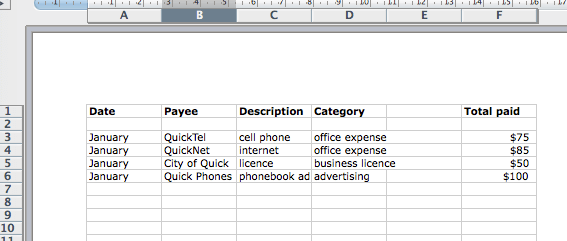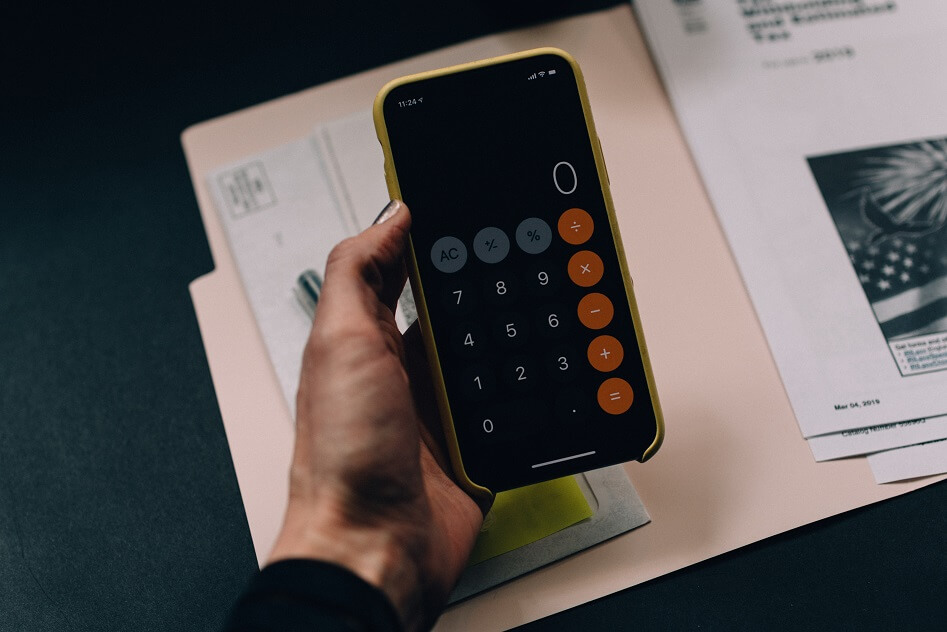Como autónomo, tienes que hacer malabarismos con muchas cosas, incluyendo una serie de tareas administrativas como tus plantillas de facturas, plantillas de alcance del trabajo o plantillas de presupuestos.
Tienes que redactar plantillas de propuestas y contratos, vincular esos contratos a tu facturación como autónomo, llevar un control de tu tiempo y gestionar múltiples proyectos. También hay que documentar los gastos y gestionar los impuestos. Tienes que supervisar los pagos, incluidos los pagos recurrentes.
Y tienes que proporcionar toda esa información a un contable en la época de la declaración de impuestos.
Aunque la contabilidad no es la tarea más agradable para muchos autónomos, realizarla con regularidad y de forma adecuada es importante para tu éxito.
Para lograr todo esto, Excel es un ejemplo de herramienta fácil de usar. Pero si no eres un experto en el uso de sus hojas de cálculo y fórmulas, puede parecer abrumador.
Veamos cómo llevar tus cuentas en Excel.

Comenzando con Excel
Excel es un programa de la suite Microsoft Office ideal para realizar seguimientos, especialmente cuando se trata de calcular números.
Puedes crear tablas y gráficos, e insertar fórmulas que sumarán, restarán o multiplicarán. También puede convertirlo a un archivo PDF para proteger el contenido y, a continuación, enviarlo por correo electrónico según sea necesario.
El trabajo que realice en Excel puede ser tan sencillo o complejo como desee. Además de la contabilidad, también puede ser una excelente manera de realizar un seguimiento de tus clientes y contratos independientes.
Veamos tres de las principales tareas administrativas de las que debes ocuparte y cómo puedes utilizar Excel para realizarlas.
1. Seguimiento de la información sobre clientes y contratos.
En su forma más simple, Excel tiene hojas de cálculo en blanco con filas y columnas que facilitan su uso para el mantenimiento de registros.
Puede utilizar una hoja de cálculo de Excel para llevar un control de sus clientes, incluyendo información de contacto, fechas de seguimiento o incluso hitos contractuales. Incluso puede realizar un seguimiento de la facturación de sus clientes y la recepción de los pagos.
Una hoja de cálculo de Excel es fácil de navegar y tiene tablas integradas, lo que facilita su uso como programa de registro.
Simplemente abre Excel, crea las categorías que necesitas rastrear y rellena la hoja de cálculo. Para un registro sencillo como este, no es necesario calcular ninguna fórmula.
Aquí hay un ejemplo sencillo de una hoja de cálculo para el seguimiento de clientes:

Las celdas de la hoja de cálculo de este ejemplo son perfectas para introducir cualquier información del cliente que desee registrar.
Ahora, aquí hay un ejemplo sencillo de seguimiento de contratos:

En este ejemplo, se realiza un seguimiento de cada contrato, incluyendo la fecha de inicio y finalización. Una vez completado el contrato, se realiza un seguimiento de cuándo se envió la factura y cuándo se recibió el pago.
De esta manera, podrás saber de un vistazo en qué punto te encuentras con cada cliente y contrato.
2. Seguir los gastos
Es importante llevar un registro de todos tus gastos como autónomo por varias razones. Ofrecemos una plantilla Excel 1099 en línea que puede utilizar para ello.
En primer lugar, te ayuda a comprender cuál es la situación de tu negocio como autónomo en términos de ingresos y gastos.
En segundo lugar, es importante en la época de declaración de impuestos. Cuando se trata de saber qué información necesitará en la época de declaración de impuestos, incluidos los gastos, consulte a un contador para asegurarse de que está conservando todos los registros pertinentes. Esto incluye aspectos como la recaudación y el pago de impuestos, así como el seguimiento de los gastos.
Puedes utilizar Excel para llevar un control de tus gastos y crear una fórmula sencilla que realice los cálculos matemáticos necesarios.
Aquí hay un ejemplo de una hoja de cálculo de Excel para el seguimiento de gastos:

Para conocer el total de todos los gastos, crea una fórmula y colócala en la columna inferior de todos los importes.
En nuestro ejemplo, en la celda F7, se colocaría la fórmula: =SUMA (F3:F6)
También puede utilizar un atajo simplemente resaltando todos los números de la columna que desea sumar y haciendo clic en Autosuma en la pestaña Inicio de Excel.
Esta es una forma sencilla de llevar un control de tus gastos en Excel. Es buena idea dedicar tiempo cada semana a rellenar la hoja de cálculo, para no acumular demasiado retraso.
Además, si te dedicas a llevar tus cuentas, es muy probable que ahorres dinero a la hora de pagar a tu contable. Después de todo, si usted no hace el trabajo preliminar, lo hará el contable, y probablemente le cobrará por horas.
En nuestro ejemplo, hemos realizado un seguimiento de los gastos publicitarios, los gastos de oficina y la licencia comercial. Según el consejo de su contador, también podría reclamar el alquiler del espacio de oficina o una parte de los gastos del hogar dedicados a la oficina en casa.
También puede documentar los gastos en equipamiento de oficina, conferencias o afiliaciones profesionales, primas de seguros y almuerzos de negocios. Un registro claro de los gastos te ayuda a calcular tus ganancias totales y le facilita el trabajo a tu contador cuando se trata de pagos o reembolsos de impuestos.
También puede considerar automatizar el seguimiento de sus gastos. Por ejemplo, Bonsai ofrece una prueba gratuita de sus servicios, que incluyen una herramienta de seguimiento de gastos. Puede centralizar, realizar un seguimiento y facturar los gastos en línea con solo hacer clic en un botón.

3. Llevar la contabilidad fiscal
Es importante saber exactamente qué hay que documentar en cuanto a los impuestos que se recaudan y los que se pagan.
La preparación de impuestos no se realiza solo una vez al año. Es recomendable contar con un contable que colabore con usted para garantizar que aprovecha al máximo todas las ventajas fiscales a lo largo del año, además de llevar un registro de toda la información relevante. Hay importantes conceptos deducibles que debe tener en cuenta a la hora de presentar su declaración de impuestos anual.
Una vez más, puede utilizar una hoja de cálculo de Excel para documentar cualquier impuesto que pueda cobrar a los clientes, si procede. Puedes llevar las cuentas en Excel para tus impuestos de forma similar a como lo haces con otros gastos. En algunos casos, es conveniente documentar la recaudación de impuestos por separado de otros gastos.
Además, cuando se trata de prepararse para la temporada de impuestos, también puede investigar opciones de software para contabilidad e impuestos.
También hay opciones para automatizar este trabajo. Por ejemplo, Bonsai está integrado con Zapier, por lo que puedes utilizar Bonsai con más de 1000 herramientas y programas diferentes.
Aquí hay un ejemplo.
Al crear «Zaps», estableces un punto de integración para que, por ejemplo, una factura pagada a través de Bonsai se envíe automáticamente a una cuenta de Quickbooks.

Otras opciones para mantener cuentas
Ahora ya conoce los conceptos básicos sobre cómo llevar la contabilidad en Excel.
Pero tal vez esto suene como un esfuerzo demasiado grande. O tal vez no tengas tiempo para dedicarte a crear fórmulas y actualizar el estado de los contratos.
No todo el mundo sabe manejar Excel, las hojas de cálculo y las fórmulas, ni tiene tiempo para aprender.
Con todo lo que tienes que gestionar al dirigir tu negocio como autónomo, quizá sería mejor que dedicaras tu tiempo a otras tareas. Cosas como buscar clientes, preparar propuestas y realizar el trabajo freelance en sí, sea cual sea.
Quizás decidas que es mejor dedicarte al trabajo que te gusta y por el que te pagan, y buscar ayuda para llevar tus cuentas.
¿Quieres saber cuál es la mejor parte?
Bonsai cuenta con una gran variedad de herramientas que te ayudarán a que tu negocio funcione sin problemas y te facilitarán la vida.
Con Bonsai, puedes pasar de las propuestas a los pagos y luego a la temporada de impuestos. Los productos están integrados y automatizados, lo que significa que ahorras tiempo y cobras rápidamente.
Las herramientas específicas para la contabilidad incluyen:
- Herramientas contractuales con notificaciones en tiempo real y facturación automática, integradas con sus propuestas y sus hojas de horas.
- Una herramienta independiente para el control del tiempo que te permite automatizar la facturación directamente desde tus hojas de horas.
- Una herramienta de seguimiento de gastos que centraliza el seguimiento y la facturación de los gastos. Puedes crear gastos y asignarlos a proyectos, conectarte a tu cuenta bancaria para importar tus gastos al panel de control de Bonsai y obtener una visión unificada de tus gastos en todos los proyectos. También puede adjuntar gastos a las facturas o facturar directamente.
Llevar una contabilidad precisa requiere tiempo y esfuerzo, pero es fundamental para el éxito de un negocio autónomo. Ahora que ya sabes cómo llevar la contabilidad en Excel, considera la opción de las herramientas integradas que tienes a tu disposición como parte del paquete para autónomos de Bonsai registrándote ahora para obtener una prueba gratuita.







